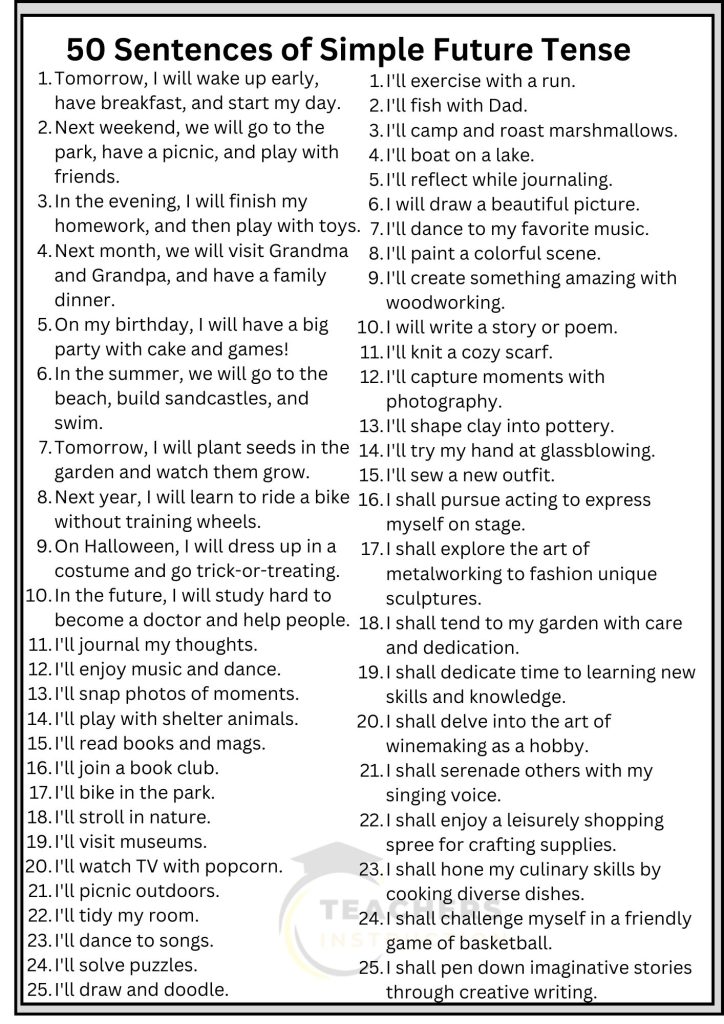The simple future tense is used to describe actions that will happen in the future. It’s one of the easiest tenses to form in English, and it’s constructed using the auxiliary verb “will” or “shall” followed by the base form of the main verb.
Here’s the basic structure for affirmative (positive) sentences:
Subject + will/shall + base form of the verb + (optional: additional information)
For example:
- I will study for my exam tomorrow.
- She will visit her grandparents next weekend.
- They will go to the beach in the summer.
- He shall accompany us to the party.
In negative sentences, the word “not” is inserted between “will” or “shall” and the base form of the verb:
Subject + will not/shall not (won’t/shan’t) + base form of the verb + (optional: additional information)
For example:
- I will not (won’t) eat junk food.
- She shall not (shan’t) forget your birthday.
- They will not (won’t) arrive late.
- He will not (won’t) miss the train.
For forming questions in the simple future tense, invert the subject and “will” or “shall”:
Will/Shall + subject + base form of the verb + (optional: additional information)?
For example:
- Will I see you tomorrow?
- Shall we meet at 8 pm?
- Will they finish the project on time?
- Will he attend the conference?
Understanding the simple future tense allows you to express actions or events that have not yet occurred but are expected to happen at some point in the future. It’s commonly used for making predictions, stating intentions, making promises, or talking about scheduled events.
50 Sentences of Simple Future Tense

- Tomorrow, I will wake up early, have breakfast, and start my day.
- Next weekend, we will go to the park, have a picnic, and play with friends.
- In the evening, I will finish my homework, and then play with toys.
- Next month, we will visit Grandma and Grandpa, and have a family dinner.
- On my birthday, I will have a big party with cake and games!
- In the summer, we will go to the beach, build sandcastles, and swim.
- Tomorrow, I will plant seeds in the garden and watch them grow.
- Next year, I will learn to ride a bike without training wheels.
- On Halloween, I will dress up in a costume and go trick-or-treating.
- In the future, I will study hard to become a doctor and help people.
- I’ll journal my thoughts.
- I’ll enjoy music and dance.
- I’ll snap photos of moments.
- I’ll play with shelter animals.
- I’ll read books and mags.
- I’ll join a book club.
- I’ll bike in the park.
- I’ll stroll in nature.
- I’ll visit museums.
- I’ll watch TV with popcorn.
- I’ll picnic outdoors.
- I’ll tidy my room.
- I’ll dance to songs.
- I’ll solve puzzles.
- I’ll draw and doodle.
- I’ll exercise with a run.
- I’ll fish with Dad.
- I’ll camp and roast marshmallows.
- I’ll boat on a lake.
- I’ll reflect while journaling.
- I will draw a beautiful picture.
- I’ll dance to my favorite music.
- I’ll paint a colorful scene.
- I’ll create something amazing with woodworking.
- I will write a story or poem.
- I’ll knit a cozy scarf.
- I’ll capture moments with photography.
- I’ll shape clay into pottery.
- I’ll try my hand at glassblowing.
- I’ll sew a new outfit.
- I shall pursue acting to express myself on stage.
- I shall explore the art of metalworking to fashion unique sculptures.
- I shall tend to my garden with care and dedication.
- I shall dedicate time to learning new skills and knowledge.
- I shall delve into the art of winemaking as a hobby.
- I shall serenade others with my singing voice.
- I shall enjoy a leisurely shopping spree for crafting supplies.
- I shall hone my culinary skills by cooking diverse dishes.
- I shall challenge myself in a friendly game of basketball.
- I shall pen down imaginative stories through creative writing.
In English, the simple future tense can be categorized into four main types based on how the action or event is perceived or expressed:
- Simple Future with “Will”: This is the most common form of the simple future tense. It is formed by using the auxiliary verb “will” followed by the base form of the main verb. This form is used to express predictions, spontaneous decisions, promises, offers, or intentions for the future. Example: “She will visit her friend next week.”
- Simple Future with “Going To”: In this form, the structure involves the phrase “going to” followed by the base form of the main verb. This form is used to express intentions, plans, or predictions based on evidence or present situations.Example: “They are going to buy a new car next month.”
- Simple Future with “Shall”: Though less common in modern English, “shall” can also be used to indicate the simple future tense, particularly in formal or British English. It follows the same structure as “will.”Example: “I shall call you when I arrive.”
- Simple Future with Future Time Expressions: Simple future tense can also be expressed using certain future time expressions such as tomorrow, next week, next month, etc. These expressions give context to when the action will occur. Example: “We will go to the movies tomorrow.”
These types allow speakers to convey different nuances or shades of meaning when discussing future actions or events.
